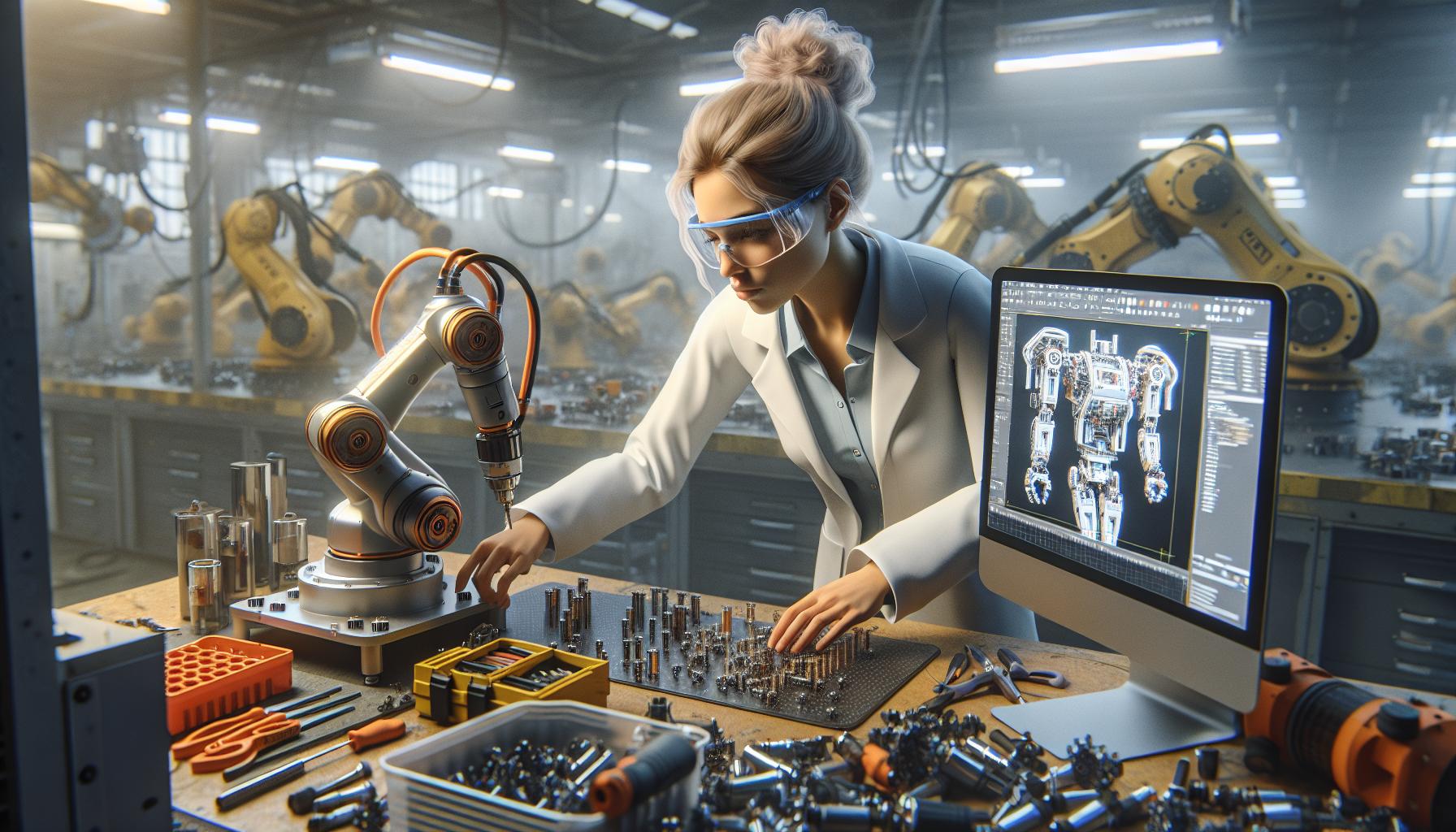When I think about the future, robotics engineers stand out as the architects of innovation. These talented individuals blend creativity with technical skills to design and build robots that can perform tasks ranging from mundane to extraordinary. As technology evolves, their role becomes increasingly vital in industries like healthcare, manufacturing, and even entertainment. Every day, robotics engineers push the boundaries of what’s possible, tackling complex challenges and developing solutions that improve our lives. Whether it’s creating autonomous vehicles or advanced surgical robots, their work fascinates me and shapes our world in remarkable ways. In this article, I’ll explore the skills, responsibilities, and impact of robotics engineers, shedding light on why they’re crucial in today’s tech-driven society.
- Robotics engineers are crucial in designing, building, and maintaining robotic systems across diverse industries such as healthcare, manufacturing, and entertainment.
- They require a blend of technical skills, including programming, mechanical and electrical engineering knowledge, and familiarity with CAD software and artificial intelligence.
- Essential soft skills for robotics engineers include problem-solving, creativity, collaboration, attention to detail, and adaptability to evolving technologies.
- A strong educational foundation, typically a degree in engineering or computer science, along with certifications, enhances career prospects in the robotics field.
- Robotics engineers have varied career opportunities in sectors like manufacturing, healthcare, automotive, aerospace, and consumer electronics, driven by rising automation demands.
- The job outlook for robotics engineers is promising, with projected growth in employment opportunities as the global robotics market expands significantly.
Robotics Engineers
Robotics engineers design, build, and maintain robots and robotic systems. They work in diverse industries, including healthcare, manufacturing, and entertainment. Their responsibilities encompass programming, testing, and optimizing robots for various tasks.
Robotics engineers possess a blend of skills in mechanical engineering, electrical engineering, and computer science. They utilize tools like CAD software for designing components and programming languages for coding behavior. A solid understanding of artificial intelligence enhances their ability to develop advanced systems capable of learning and adapting to environments.
The impact of robotics engineers extends beyond technical advancements. They contribute to improving efficiency and safety in workplaces by automating hazardous tasks. For example, robotic arms in manufacturing streamline assembly processes, while surgical robots enhance precision during operations.
Overall, robotics engineers are key innovators driving progress across multiple sectors. Their expertise shapes not only the future of technology but also the way we interact with our world.
Skills Required for Robotics Engineers

Robotics engineers need a range of essential skills to design and develop advanced robotic systems. These skills divide into technical and soft categories, both critical for success in the field.
Technical Skills
- Programming Proficiency: Mastering programming languages like Python, C++, and Java enables robotics engineers to create and refine software systems. They implement algorithms that drive robot behavior.
- Mechanical Engineering Knowledge: Understanding mechanical design principles allows robotics engineers to construct physical components effectively. They apply knowledge of materials and structural analysis.
- Electrical Engineering Skills: Expertise in circuit design and electronics is vital. Engineers design and troubleshoot electronic systems and integrate sensors and actuators into robots.
- Familiarity with CAD Software: Proficiency in computer-aided design (CAD) software aids in creating detailed models of robotic systems. Tools like SolidWorks or AutoCAD are common in the industry.
- Knowledge of Artificial Intelligence: Comprehension of AI principles and machine learning enhances engineering processes. Engineers develop intelligent systems that can adapt and improve through experience.
- Robotics-Specific Protocols: Staying informed about relevant protocols, control systems, and interfaces like ROS (Robot Operating System) improves the ability to manage complex robotic architectures.
- Problem-Solving Ability: Strong analytical skills enable robotics engineers to assess challenges and devise effective solutions. They troubleshoot issues during the design and testing phases.
- Creativity: Innovation is vital in robotics design, requiring engineers to think outside the box. They develop novel approaches to advance robotic applications.
- Collaboration: Robotics engineers often work in multidisciplinary teams. Effective collaboration skills enhance communication and foster productive working relationships among engineers, designers, and project managers.
- Attention to Detail: Precision is critical in robotics work, as small errors can lead to significant failures. A keen eye for detail ensures that processes and designs meet rigorous standards.
- Adaptability: The robotics field evolves rapidly. Adaptability allows engineers to incorporate new technologies and methodologies, continually improving designs and processes.
Education and Training Pathways

Robotics engineers require a strong educational foundation and ongoing training to excel in their field. Specific degrees and certifications enhance their expertise and career prospects.
Relevant Degrees
Most robotics engineers hold a bachelor’s degree in robotics engineering, mechanical engineering, electrical engineering, or computer science. These programs provide essential knowledge about design, programming, and system integration. A master’s degree in robotics or a related field often leads to advanced roles, focusing on specialized areas like artificial intelligence or machine learning. Many institutions offer interdisciplinary programs that merge engineering and computer science concepts, preparing graduates for various career paths in robotics.
Certifications and Specializations
Certifications can enhance the skill set of robotics engineers. Professional certifications, such as those offered by the Institute of Electrical and Electronics Engineers (IEEE) or the Robotics Certification Standards Alliance, validate expertise in specific areas. Specializations in fields like automation, AI development, or mechatronics provide focused knowledge necessary for advanced roles. Obtaining certifications in programming languages such as Python or C++ further demonstrates proficiency. These qualifications help robotics engineers stay current with industry standards and strengthen their employability.
Roles and Responsibilities of Robotics Engineers

Robotics engineers play a crucial role in creating automated systems that enhance efficiency across various sectors. Their responsibilities encompass several key areas.
Design and Development
Robotics engineers design and develop robotic systems tailored to specific applications. They use computer-aided design (CAD) software to create detailed models, ensuring that the designs meet functional requirements. Engineers often collaborate with multidisciplinary teams during the design phase, integrating mechanical, electrical, and software components. They must stay current with emerging technologies and industry trends to incorporate innovative solutions into their designs. For example, developing a robotic arm for manufacturing involves selecting appropriate materials, optimizing the mechanical structure, and ensuring compatibility with control systems.
Testing and Implementation
Testing and implementation are vital aspects of a robotics engineer’s role. Engineers rigorously test robots to evaluate their functionality, reliability, and safety before deployment. They develop testing protocols to simulate real-world scenarios, identifying potential issues and making necessary adjustments. Once confirmed, engineers oversee the implementation process, which includes programming robots for specific tasks and integrating them into existing systems. Continuous monitoring after implementation ensures the robots operate efficiently, allowing for troubleshooting and updates as needed.
Career Opportunities for Robotics Engineers
Robotics engineers encounter diverse career opportunities across multiple industries. They apply their skills to various roles, influenced by industry needs and technological advancements.
Industry Sectors
Robotics engineers operate in several key sectors, including:
- Manufacturing: Engineers design robotic systems for assembly lines, enhancing production efficiency while minimizing human error.
- Healthcare: Engineers create surgical robots that assist surgeons, improving precision and patient outcomes.
- Automotive: Engineers develop autonomous vehicles, focusing on safety features and intelligent navigation systems.
- Aerospace: Engineers design drones and robotic systems for exploration, surveillance, and transport.
- Consumer Electronics: Engineers innovate smart home devices, integrating robotics for enhanced user experiences.
These sectors demand tailored skills and knowledge, allowing robotics engineers to tackle industry-specific challenges effectively.
Job Outlook
The job outlook for robotics engineers remains robust, driven by rapid advancements in technology. The U.S. Bureau of Labor Statistics projects a growth rate of 9% from 2020 to 2030 for all engineering occupations, with robotics engineering territories expecting even higher rates due to increasing automation across industries.
According to a report by Grand View Research, the global robotics market is set to reach $189.36 billion by 2027, prompting a surge in demand for skilled workforce professionals. This trend indicates strong opportunities for robotics engineers in both established and emerging fields, fostering career stability and longevity.
Robotics engineers are shaping the future of technology in ways I find truly inspiring. Their unique blend of creativity and technical skills allows them to tackle complex challenges across various industries. As they continue to innovate and enhance automation, the impact of their work becomes increasingly vital.
I’m excited to see how robotics engineers will further transform sectors like healthcare and manufacturing. With the demand for skilled professionals on the rise, pursuing a career in robotics engineering seems like a promising path. The future is bright for those ready to embrace the challenges and opportunities this dynamic field offers.

